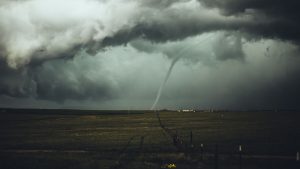
Duck and Cover
Carrying winds of over 200 miles per hour, tornadoes are incredibly destructive rotating air columns that can form during thunderstorms, according to the Federal Emergency Management Agency (FEMA). If a tornado warning is issued in your area, protecting the well-being of yourself and your family is of paramount importance—so take shelter immediately. This can be in a basement, safe room, storm shelter or a small, windowless interior room on the lowest level of a home if there is no basement. Stay away from any windows, doors and outside walls as tornadoes can create deadly flying debris. Take the time now to create an emergency kit of food, water and other necessary supplies, and make sure to stock extra supplies in your shelter.
Don’t take shelter underneath an overpass or bridge, as these structures could potentially collapse during a tornado. If you do find yourself in a vulnerable place, protect your head and neck by covering them with your arms. Also, use care when performing any cleanup following the tornado, as FEMA says significant injury and death can result from these activities.
Insurance Considerations
While it’s important to protect yourself and your loved ones from tornado dangers, it’s also crucial to buy a robust insurance policy for your home, business and belongings before disaster strikes.
Homeowners insurance varies in terms of coverage, but it should cover the cost to repair or completely rebuild your house and any attached or unattached structures on your property. This type of insurance should also cover your personal belongings, from clothes to furniture and appliances—although you may have to add separate umbrella coverage for jewelry, art or other expensive items. According to FEMA, most property insurance policies cover losses resulting from windstorms, under which tornadoes are classified.
If you live in a condo, your condo association has a master policy that covers property damage, but it doesn’t cover your personal belongings, so buying condo insurance may be a wise choice. And just like your home, property insurance for a business typically covers losses from the wind.
Protect Your Property Today
Need to purchase insurance for your home or condo but you don’t know where to begin? Our experienced team of insurance experts is here to help you build a policy that will give you the peace of mind you deserve. Reach out to us today.
